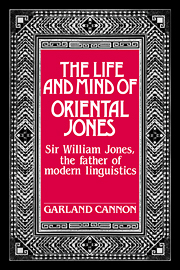Book contents
- Frontmatter
- Contents
- Preface
- Introduction
- Chronology of Jones's Life
- 1 A Barbaric Oriental Conqueror (to 1770)
- 2 Delicate Arab Maidens and Liquid Ruby (1770–1772)
- 3 Persian Jones and Constitutional Law (1772–1777)
- 4 The Athenian and Eleutherion (1778–1780)
- 5 An Ass Laden with Gold (1780)
- 6 Politics: Writings and Activism (1780–1782)
- 7 James River Property (1782–1783)
- 8 A Vision in the Indian Ocean (1783–1785)
- 9 A Sacred Oriental Language (1785)
- 10 A Genetic Explanation: Indo-European (1786–1787)
- 11 Sanskrit Literary Treasures (1787–1788)
- 12 An Indian Renaissance (1789)
- 13 A Burning Tropical Sun (1790–1791)
- 14 Scholar-Martyr (1791–1794)
- 15 Jones Today
- Appendix Five New Letters by Jones
- Notes
- Selected Bibliography
- Index
12 - An Indian Renaissance (1789)
Published online by Cambridge University Press: 11 September 2009
- Frontmatter
- Contents
- Preface
- Introduction
- Chronology of Jones's Life
- 1 A Barbaric Oriental Conqueror (to 1770)
- 2 Delicate Arab Maidens and Liquid Ruby (1770–1772)
- 3 Persian Jones and Constitutional Law (1772–1777)
- 4 The Athenian and Eleutherion (1778–1780)
- 5 An Ass Laden with Gold (1780)
- 6 Politics: Writings and Activism (1780–1782)
- 7 James River Property (1782–1783)
- 8 A Vision in the Indian Ocean (1783–1785)
- 9 A Sacred Oriental Language (1785)
- 10 A Genetic Explanation: Indo-European (1786–1787)
- 11 Sanskrit Literary Treasures (1787–1788)
- 12 An Indian Renaissance (1789)
- 13 A Burning Tropical Sun (1790–1791)
- 14 Scholar-Martyr (1791–1794)
- 15 Jones Today
- Appendix Five New Letters by Jones
- Notes
- Selected Bibliography
- Index
Summary
In artistic implications for posterity, 1789 was Jones's most important year. It began with Yonge's acceptance of his offer to help to transfer Asia's spicy forests to St. Vincent. Indirectly apologizing for having to ask Shore to relay Yonge's letter to Kyd, Jones could assist only as much as the digest would permit. He asked Claud Martin, who was to be Cornwallis's aide, to send Yonge all the seeds that could be collected.
Jones's association with Shore remained literary. When Jones's maulvi composed a Persian poem on the subject of Thomas Parnell's “The Hermit,” Shore made a copy. Jones asked Shore to explain a Homeric episode to the Indian, who might imitate it. Shore sent an amatory ode by Wahsi, which almost equaled Metastasio's on the subject and surpassed other Persian odes that Jones knew. Jones's chief fellow appreciator of Persian was now Richard Johnson, whom he and Anna sometimes visited on weekends. Johnson lent him a copy of the Sháhnáma, which he pleasurably read aloud.
One reason for Jones's emphasis on Persian was his Sixth Discourse for the Society on 19 February. It is his most unreliable discourse, despite his assertion that his long, attentive study can supply more positive information on Persia than on any other nation. He reaches four dubious conclusions. First, there was a powerful Hindu monarchy in Persia long before the Assyrian empire. Second, the language of the first Persian empire was the mother of Sanskrit, Greek, Latin, and Gothic.
- Type
- Chapter
- Information
- The Life and Mind of Oriental JonesSir William Jones, the Father of Modern Linguistics, pp. 298 - 315Publisher: Cambridge University PressPrint publication year: 1991

